Keeping you informed on News and Views within the funeral planning industry
How To Write A Eulogy

Writing a eulogy can feel daunting, especially during a time of grief. But it’s also an opportunity to honour the life, spirit and legacy of someone you deeply cared about. This guide will help you craft a eulogy that feels sincere, respectful and memorable.
What is a Eulogy?
A eulogy is a speech or tribute that commemorates someone’s life after they’ve passed. It’s often read during a funeral or memorial service and may be delivered by a family member, friend, colleague or celebrant. More than just a biography, a eulogy captures the essence of who the person was – their values, passions, quirks and impact on others.
Who Usually Delivers a Eulogy?
Eulogies are most often given by those who knew the person best: children, siblings, partners, lifelong friends, or close colleagues. However, if you’re planning ahead, you may choose to write your own eulogy as part of your funeral wishes – a growing trend in personalised end-of-life planning.
How Long Should a Eulogy Be?
A good eulogy is typically between 3 to 7 minutes long (around 500-1,000 words). That’s enough time to share meaningful stories and messages without overwhelming your audience. When in doubt, aim for heartfelt and concise.
How to Write a Eulogy in 6 Simple Steps

1. Reflect Before You Write
Take a quiet moment to remember your loved one. What made them special? What will you miss most? What stories truly capture who they were?
Jot down a few thoughts, keywords or memories – these will become the foundation of your eulogy.
2. Structure Your Eulogy
Organising your thoughts helps the audience follow your message and keeps you grounded. A helpful structure might look like:
- Introduction: state your relationship and acknowledge the loss. Take a moment to express your love, gratitude and the impact your loved one made on your life.
- Life overview: key milestones, achievements and life events. Choosing core moments isn’t always easy. Take the time to speak to family members to go over your thoughts and stories together.
- Personal stories: heartfelt or humorous memories
- Character traits: what made them who they were. Perhaps your loved one was always the one to make people laugh or was always the person who made time to sit and listen to people.
- Closing tribute: a message of love, farewell or inspiration to summarise your relationship with the loved one you have lost
3. Choose a Tone That Fits
A eulogy doesn’t need to be overly formal. A conversational tone – warm, reflective, even humorous, where appropriate – is often most impactful.
4. Include Quotes, Readings or Songs
If they had a favourite poem, lyric or quote, you may want to include it. These can lend meaning and emotional depth, especially if tied to a personal memory.
5. Edit for Clarity and Length
After your first draft, read it aloud and make gentle edits. Ask someone you trust to review it or record yourself to hear how it flows.
6. Practice Reading It
Practising in advance helps with pacing and builds confidence. Don’t worry if you get emotional, just pause, breathe and continue when ready. There may be some points that trigger emotions, no matter how many times you read it, and you may wish to consider leaving those triggers out.
Helpful Writing Prompts
If you’re struggling to get started, try answering these questions:
- What did they teach you?
- What would make them laugh?
- What do you want others to remember most?
- What was their proudest moment?
- How would they want to be remembered?
Eulogy Examples
For a Parent
“Good morning, everyone. For those who don’t know me, I’m Rachel, Peter’s daughter.
“My dad was the kind of man who would give you the last biscuit, the best seat and always a hand when you needed one. He wasn’t loud or flashy, but he was deeply loyal – to his family, his football team and his principles.
“One of my favourite memories was our Saturday mornings – rain or shine, he’d drive me to swimming lessons with a flask of tea in one hand. It’s in those little things I’ll always find him.
“Dad never wanted a fuss, so I won’t make this long. But I’ll say this: if we can all carry a little of his kindness with us, the world will be better for it. Thank you, Dad, for everything.”
For a Friend
“Good afternoon, everyone. My name is Sam, and I have had the privilege of calling Daniel my best friend for over 20 years.
“I’ve been struggling to find the right words – not because there’s nothing to say, but because there’s simply too much. Daniel was the kind of friend who showed up. Whether it was helping you move house or just sitting beside you in silence on a hard day, you never had to ask – he was just there.
“One of my favourite memories is our trip to Cornwall when we were in our twenties. We got hopelessly lost, the tent blew over, and we spent the night in the car eating cereal bars. He laughed the whole time. That’s who Daniel was – he could turn frustration into adventure, and the ordinary into something unforgettable.
“He loved books, terrible puns, and fiercely believed in treating people with kindness. If he had £5 and you needed it, it was yours. No questions.
“Daniel never liked being the centre of attention – he’d probably cringe at all this. But I hope he’d forgive me, just this once. Because he mattered. To me, to his family, and to everyone lucky enough to know him.
“I’ll miss him every single day. But I’ll carry his humour, loyalty and generosity with me — and try to pass a little of that on. That’s how we keep him alive.
Thank you.”
For a Spouse
“Hello, everyone. I’m Emma, and I was married to Michael for 28 beautiful years.
“I could stand here and list all of Michael’s qualities – his warmth, his wit, the way he could fix absolutely anything. But what I really want to talk about is the way he made people feel.
“Michael made you feel safe. Seen. Loved. He had this quiet way of listening – really listening – as though what you were saying was the most important thing in the world.
“He proposed to me with a cup of tea. No big speech, just: “I’d really like to do this life with you.” And we did. We raised two incredible children. We built a home. We danced in the kitchen when no one was looking. We had fights, laughter, late-night chats and Sunday lie-ins. And I would do it all again in a heartbeat.
“One of the last things he said to me was: “Make sure the kids know how proud I am.” And I hope they hear that now – because he was. So proud. So full of love.
“I’ll miss the way he laughed when he thought no one could hear. I’ll miss the cups of tea. But most of all, I’ll miss the feeling of being truly known – and truly loved.
“Michael, thank you for choosing me. Thank you for every moment. I’ll carry you with me, always.”
Can a Eulogy be Humorous?

A eulogy can be humorous when done with love and sensitivity. Humour can:
- Celebrate a person’s unique personality, especially if they were known for their wit or sense of fun.
- Help break the tension in a highly emotional setting.
- Create moments of connection by reminding people of shared stories and joyful memories.
Many people find that laughter through tears can be a healing experience. That said, it’s important to consider your audience and ensure the humour is respectful and inclusive. Avoid anything that might cause offence or overshadow the tribute.
If your loved one had a favourite joke, a quirky habit or a funny story everyone remembers, sharing it can bring warmth and authenticity to your speech.
Delivering a Eulogy
As the person writing and delivering a eulogy, it can bring up a variety of emotions. It can also feel daunting to capture everything that is most important on the day and knowing that you can’t cover everything is okay. Just do your best. Sometimes it’s okay to go off script, read the room, and allow the memories that feel right to share in that moment to surface.
Remind yourself that there’s no rush when delivering a eulogy. Speak slowly and mindfully, making eye contact with people in the room when you can. Best of all, don’t overthink it. We’re all human and, most of all, reading a eulogy is emotional. Don’t go in with expectations of the perfect speech without raw, unedited feelings and thoughts creeping into the equation.












Share this content...